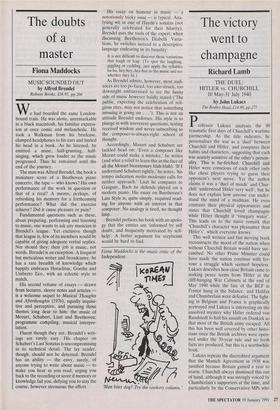The doubts of a master
Fiona Maddocks
MUSIC SOUNDED OUT by Alfred Brendel
Robson Books, £16.95, pp.266
We had boarded the same London- bound train. He was alone, unremarkable in a black macintosh, his familiar express- ion at once comic and melancholic. He took a Walkman from his briefcase, clamped headphones to his ears and buried his head in a book. As he listened, he emitted a noise, half-grunting, half- singing, which grew louder as the music progressed. Thus he remained until the end of the journey.
The man was Alfred Brendel, the book a miniature score of a Beethoven piano concerto, the tape — who knows? His own performance of the work in question or that of a rival? A means, perhaps, of refreshing his memory for a forthcoming performance? What did the exercise achieve? Did it cause pleasure or pain?
Fundamental questions such as these, about preparing, performing and listening to music, one wants to ask any musician in Brendel's league. Yet exclusive though that league is, few of its members would be capable of giving adequate verbal replies. Nor should they; their job is music, not words. Brendel is an exception. A frequent but meticulous writer and broadcaster, he has a rare breadth of knowledge which happily embraces Heraclitus, Goethe and Umberto Eco, with an eclectic style to match.
His second volume of essays — drawn from lectures, sleeve notes and articles is a welcome sequel to Musical Thoughts and Afterthoughts (1976), equally inquisi- tive and perceptive, and pursuing those themes long dear to him: the music of Mozart, Schubert, Liszt and Beethoven; programme compiling; musical interpre- tation.
Fluent though they are, Brendel's writ- ings are rarely easy. His chapter on Schubert's Last Sonatas is uncompromising in its technical detail. The lay reader, though, should not be deterred. Brendel has an ability — the envy, surely, of anyone trying to write about music — to make you hear as you read, urging you back to the recording or score if memory or knowledge fail you, defying you to stay the course, however strenuous the effort. His essay on humour in music — a notoriously tricky issue — is typical. Ana- lysing wit in one of Haydn's sonatas (not generally celebrated for their hilarity), Brendel uses the tools of the expert; when discussing Beethoven's Diabelli Varia- tions, he switches instead to a descriptive language endearing in its banality:
It is not difficult to discover those variations that laugh or leap. (To spot the laughing, giggling or cackling, just apply the syllables ha-ha, hey-hey, hee-hee to the music and see whether they fit.)
As Brendel admits, however, most audi- ences are too po-faced, too awe-struck, too downright embarrassed to see the funny side of music however baldly stated (`The public, expecting the celebration of reli- gious rites, may not notice that something amusing is going on . . .'). This is not an attitude Brendel endorses. His style is to plunge in with irreverent questions, testing received wisdom and never subscribing to the composer-is-always-right school of thought.
Accordingly, Mozart and Schubert are tackled head on: 'Even a composer like Mozart could make a mistake,' he writes (and what a relief to learn this in the face of all the Mozart bicentenary blah-blah). 'If I understand Schubert rightly,' he notes, 'his tempo indication molto moderato calls for neither approach.' Liszt he compares to Gauguin, Bach he defends played on a modern piano. His essay on Beethoven's Late Style is, quite simply, required read- ing for anyone with an interest in that composer. No analogy is tired, no thought limp.
Brendel prefaces his book with an apolo- gy that the entries are 'informed by self doubt, and frequently motivated by self- help'. A better argument for scepticism would be hard to find.
Fiona Maddocks is the music critic of the Independent.
`Man bites dog? Try the cookery column.'


















































 Previous page
Previous page